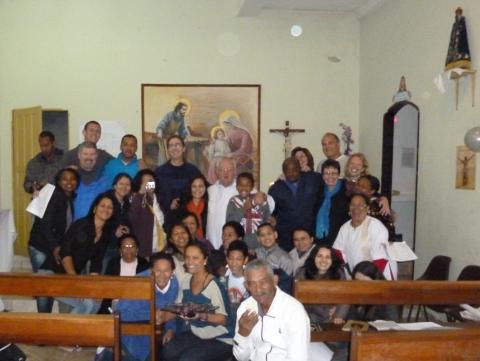
Advent is a season of waiting – waiting for God’s promises to be fulfilled. As people of faith, we believe that God will be faithful. We know from experience, however, that this does not mean we will not encounter difficulty, defeat, and suffering. So what does God’s faithfulness actually mean?
The people in today’s readings find themselves in difficult situations. Ahaz, the king of Judah, under pressure of attack from would-be allies, found himself tempted to rely on an earthly power (Assyria). Isaiah relays the word of the Lord, that Ahaz should trust in God’s faithfulness, and that he may even ask for a sign from the Lord. Ahaz does not want a sign, but God, through Isaiah, gives him one anyway – that a young woman would conceive, bear a son, and name him Emmanuel. Today’s reading ends here, but the story continues: Ahaz refuses to trust in the Lord and instead trusts in Assyria, placing his kingdom under subjugation. So then what happened to God’s promise of faithfulness?
In today’s Gospel reading, Joseph also finds himself in a sticky situation. When Mary’s pregnancy is discovered, he believes that the right thing to do under Mosaic law is to divorce her. He wants to do the right thing, but he does not want Mary to suffer. We can imagine his anguish at the situation. Like Ahaz, Joseph receives a message from God, this time from an angel in a dream who explains the situation and promises that the child to be born will save the people from their sins. Matthew connects this message to the message Isaiah gave to Ahaz – a promise given that in fact has not been broken (despite Ahaz’s lack of faith), and is about to be fulfilled in a new and more complete way. And the promise is this: God with us. Emmanuel. Not God-who-will-fix-every-difficulty-and-prevent-all-suffering-right-now. God who will be with us, who will live with us, who will rejoice with us, who will suffer and die with us. This is God’s solidarity with God’s people.
In the parish of Santa Terezinha on the outskirts of the city of Sāo Paulo, where I worked during my years of mission in Brazil, every year the Christmas novena is held during Advent. Groups of parishioners visit local homes each evening, for nine evenings, to read and reflect on scripture, pray, and sing. The outskirts of the city are filled with families who, over the years, have migrated from the northeast of Brazil. They leave their arid home states in hopes of finding work and better opportunities. Many live in crowded favelas (slums), enduring constant noise, the violence of the drug trade, high illiteracy rates, negative stereotypes and derision directed at northeasterners, and other social challenges.
One night during my first year on mission, I joined a group visiting three homes. The group was from one of the parish's worshipping communities, Sāo José, located in a hillside favela. We walked along narrow, winding pathways in the December heat, carrying a statue of a pregnant Mary. Arriving at one home, we were invited in. We entered a very small, narrow living room – the family insisted our group of five sit on the available sofa and chairs while they stood in the doorways. As we heard the scripture and sang together, there was a moment when I mentally stood back to observe the scene – about eight adults and several kids crammed into a small room, the statue of Mary sitting on a low table, heads bowed in prayer, in a tiny house perched precariously on a chaotic, noisy hillside overlooking South America’s largest city. “This,” I thought, “this is what God-with-us means.” In the midst of a neighborhood burdened by economic hardship and difficult social challenges, in the midst of the varying personal journeys that brought each one of us in that room to that moment, these people had heard God’s promise of faithfulness and had themselves, through their prayer and dedication, become a sign of God’s faithful presence among us.
In addition to the Fourth Sunday of Advent, today we mark International Migrants Day. Our Gospel passage ends with Joseph taking Mary into his home, but as the story progresses, Joseph, Mary, and the child Jesus are forced to flee Herod’s persecution. Today migrants move for many reasons: to escape war, to find better economic opportunities, to flee persecution. We can be signs of God’s promise today by working for humane policies that protect migrants’ human rights and leave no one behind.
Photo: Members of the community of São Jose, one of the five communities of Santa Terezinha parish, and some visitors from a Friends Across Borders immersion trips. Catherine Heinhold is on the back right, with red hair. Photo courtesy of Maryknoll Lay Missioners.
